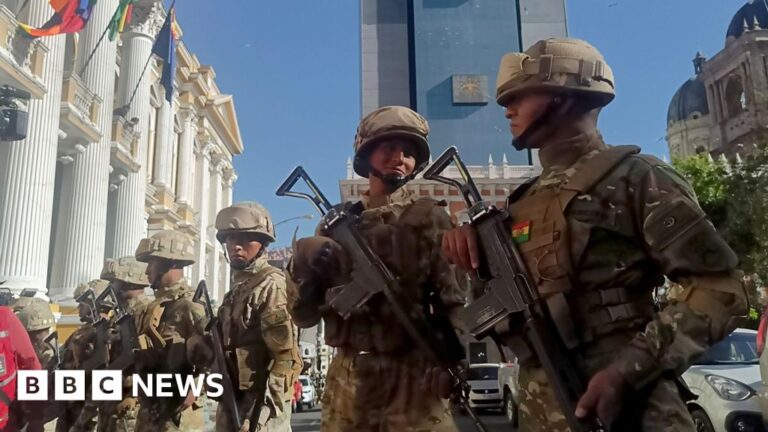Bolivia’s leader condemned an attempted coup in the administrative capital, La Paz, after the presidential palace was stormed by soldiers.
Armored vehicles and troops also took up positions Wednesday in Murillo Square, where key government buildings are located. They would now have started to withdraw.
The rebel military officer in charge, General Juan José Zúñiga, said he wanted to “restructure democracy” and that although he respected President Luis Arce for now, there would be a change of government.
President Arce called on public opinion to “organize and mobilize against the coup, in favor of democracy.”
“We cannot allow coup attempts to once again cause victims in Bolivia,” he said in a televised message to the country inside the presidential palace.
He also announced he was appointing new military commanders, confirming reports that General Zúñiga had been removed from office after openly criticizing former Bolivian leader Evo Morales.
Mr Morales also condemned the coup attempt and called for criminal proceedings to be initiated against General Zúñiga and his “accomplices”.
The prosecution announced the opening of a criminal investigation.
Earlier, troops blocked the entrances to Murillo Square and entered the presidential palace after the doors were broken down.
Speaking from Murillo Square after its capture by troops, General Zúñiga declared: “We are going to recover this homeland.”
“An elite took over the country, vandals who destroyed the country,” he said.
General Zúñiga also declared that “political prisoners”, including Former leader Jeanine Áñez is imprisoned would be released.
General Zúñiga appeared on television on Monday and said he would arrest Mr. Morales if he ran for office again next year, although he is barred from doing so.
Mr Morales – who resigned as president and was replaced by Ms Áñez after the army chief urged him to resign amid protests over allegations of voter fraud in the 2019 election – has also called on democracy supporters to strike and block roads.
A former ally, Mr. Morales is currently opposed to Mr. Arce, although they come from the same socialist movement, and political tensions between the two men are growing.
The attempted coup sparked international condemnation, including from several Latin American countries.
The leader of neighboring Paraguay issued a “strong call for respect for democracy and the rule of law”, while the Mexican president expressed the “strongest condemnation of the coup attempt”.
The United States said it was closely monitoring the situation in Bolivia and called for restraint.
“The European Union condemns any attempt to disrupt the constitutional order in Bolivia,” EU foreign policy chief Josep Borrell wrote on social media.
Mr. Arce was elected after a period of instability following the 2019 elections.
Mr. Morales, the first president from Bolivia’s indigenous majority, implemented a radical agenda after coming to power in 2005, aimed at addressing social divisions and extreme inequality.
The former coca union leader resigned in 2019 after trying to circumvent the constitution and seek a fourth term. He was replaced by Ms Áñez, who declared herself interim president in November 2019.
However, in a repeat election in 2019 a year later, Mr Arce won, returning the socialist Mas party to power. Ms. Áñez was sentenced to 10 years in prison for “decisions contrary to the constitution.”


